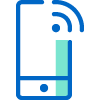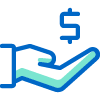Offline Security
Menu
Protecting yourself offline
With our use of technology increasing, many forms of fraudulent activity have gone online. But it’s important to remember that there are other forms of fraud out there. Education can help you better safeguard yourself against all types of fraud so make sure to read below and learn some of the things to watch out for.
Learn more about it
Different types of fraud that happen outside the digital space
Cheque Fraud
How we protect you
- Our deposit hold policy helps protect your account from cheque fraud
- You may notice that we ask questions about your transactions to help determine if you’re being scammed
- We educate our staff on fraud trends and scams to help them identify fraud. If a cheque looks unusual, we’ll take steps to verify its authenticity
How you can protect yourself
- Beware of sophisticated knock-offs
- Counterfeit cheques often say “Guaranteed Funds” or “Certified” on the face of the cheque and may appear to be from a respected financial institution or well-known company.
- Be careful who you accept cheques from. A cheque can be returned as counterfeit even after the clearing process and hold period is complete. You are ultimately responsible for cheques you deposit to your account.
Debit Card safety
Here are some important FAQs answered
Yes. All debit cards issued May 24 2017 and later are enabled with Interac Flash, a quick and safe way to make small purchases by tapping your card on any Interac Flash-enabled payment terminal. If you have a microchip-only debit card and would like to switch to a card with Interac Flash capabilities, please visit your nearest branch to get set up free of charge.
No. Debit cards with Interac Flash use EMV secure chip processing to store and process data securely. This means members are protected against fraudulent activity, including skimming, electronic pickpocketing, and other types of fraud.
Yes. Many countries have implemented chip technology and the chip on your debit card will be compatible with these systems. In countries that have yet to introduce chip or are in the process of implementing, such as the United States, cardholders will still be able to use their debit cards by making a swipe transaction.
When you travel internationally, you can make foreign currency withdrawals at any ATMs displaying any of the logos printed on the back of your card.
We recommend that when travelling internationally, you carry more than one method of payment (credit card, debit card or small amounts of local currency).
If you experience any difficulty using your Coast Capital debit card while travelling outside of Canada, call us at 1-888-517-7000.
All members are required to use their new card at any ATM or to make a purchase within 90 days of receiving it. Even if you only use Coast Online® or Coast-by-Phone® banking, you’ll still need to use your new card at least once within 90 days to ensure you continue to enjoy access to these Coast Capital banking services.
Romance scams
The scam involves an individual gaining the affection and trust of their victim and then gains access to the victim’s bank account or credit cards to steal their money. Or the fraudster commits fraud using the victim’s identity. Here are some red flags to watch out for:

Yes, that Tinder profile could be fake. Scammers use apps, dating sites and social media to set up bogus profiles (using fake photos and personal information) to gain their victim’s trust and interest.

This can include a reluctance to meet up in person. Sometimes the scammer will use the excuse they’re "working out of town for a long period of time”, or they live overseas.

Consider why the individual would be asking for money in the first place. In the end, it’s recommended to not send money especially if you’ve never met them and can’t verify their identity. It can be tempting to want to help someone but you could lose hundreds of thousands of dollars.

Cryptocurrency scams are on the rise. In these cases, investor scammers persuade their victims with promises of fast returns on cryptocurrency investments, then disappear with the money. If someone is pressuring you to invest in cryptocurrency, it could be a sign you’re being scammed.
Identity Theft
Fraudsters use your personal information, without your knowledge or consent, to impersonate you. Phishing is an example of identity theft.
Some warning signs
- Your paper statement, online account summary or passbook lists transactions that you have not performed or authorized.
- You are receiving credit card statements or other bills in your name that do not belong to you.
- You are not receiving legitimate credit card or bank account statements or you notice that not all of your mail is delivered.
- A collection agency contacts you to inform you that they are collecting for a default account established with your identity.
How they do it
Key pieces of your personal information are stolen and used to impersonate you and commit crimes in your name. Important documents may be stolen from your mail or garbage without your knowledge like your SIN number, banking information and more.
Once the information has been stolen, your identity could be used to conduct spending sprees, open bank accounts, redirect mail, or apply for loans, credit cards and social benefits.
